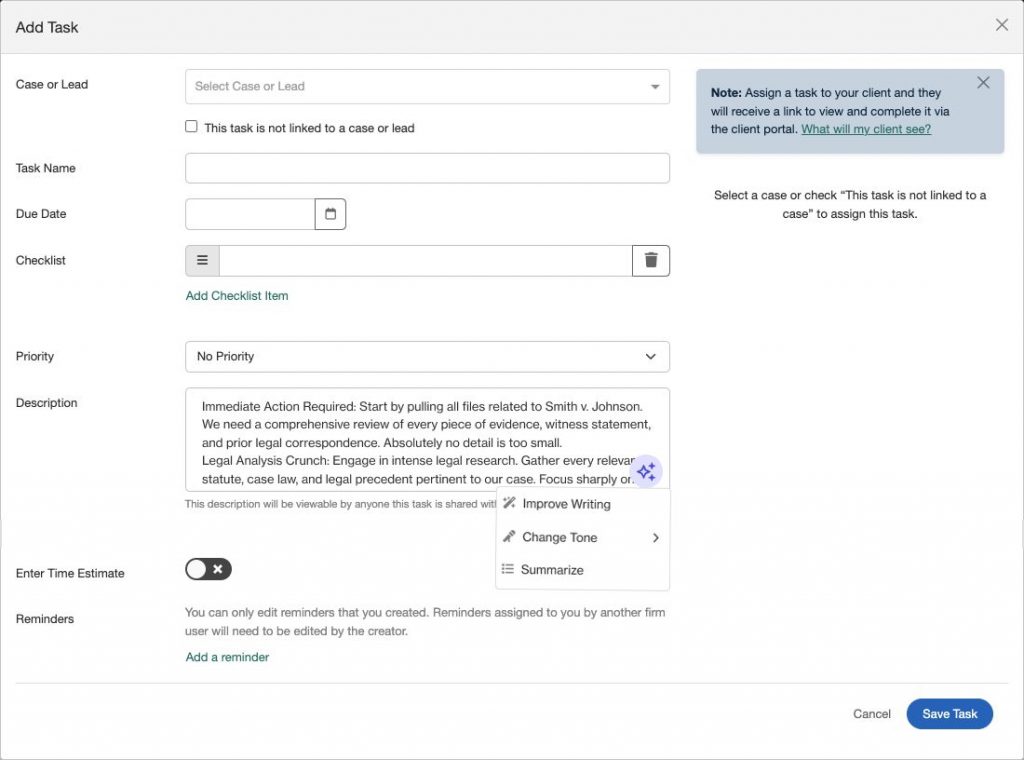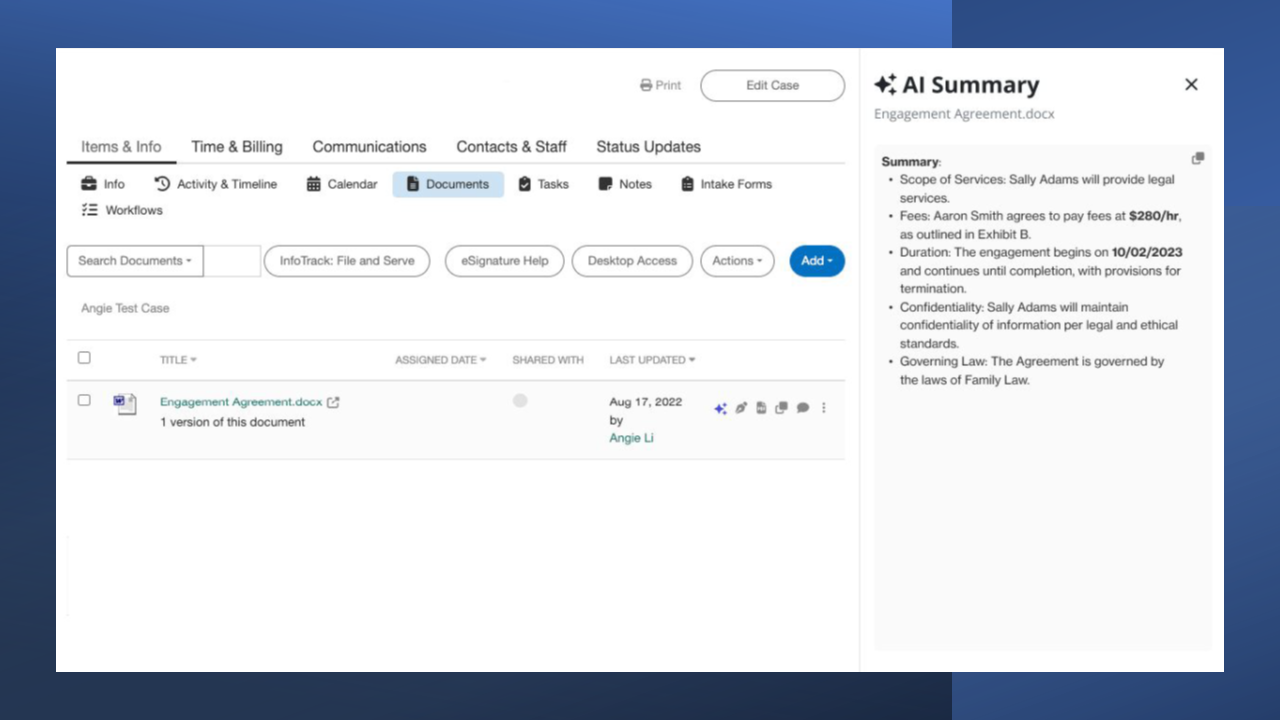AffiniPay, the parent company of a group of technology products for managing law practices and accepting online payments, including LawPay and MyCase, today announced the launch of AffiniPay IQ, its strategic initiative to embed generative artificial intelligence across all of its products and make AI a native component of legal professionals’ daily workflows.
AffiniPay is kicking off this initiative by releasing the first two of these features in beta within the MyCase law practice management platform. Going forward, it will expand its use of generative AI within MyCase and also to its other legal technology products, CASEpeer, the case management platform for personal injury practices, LawPay, the online payments platform, and Docketwise, the practice management platform for immigration lawyers.
“In the same way that cloud and the move to cloud fundamentally shifted how we thought about software and modern software and the ability to evolve it, we believe generative AI is going to be a core part of providing a modern legal practice management platform,” Dru Armstrong, AffiniPay’s chief executive officer, told me during an interview this week. “So this is just the beginning for us in terms of the ways that we’re going to be incorporating it into the platform.”
Listen: On LawNext: AffiniPay CEO Dru Armstrong on the Intersection of Fintech, Legal Tech and AI.
The two features released in beta for MyCase are:
- Document summarization, enabling users to select a document, click the AI button, and create an AI-generated summary in order to make it easier to review. This is being released live in beta today.
- Text editing, enabling users to edit their writing to change the tone or style or shorten the text. This will go live in beta on Jan. 31.
The features are available to any MyCase customers. Both features will also soon be released in CASEpeer and text editing will soon be added to LawPay, the company said.

With the text editor, write your text, click the AI icon, and then choose whether to improve writing, change tone or summarize.
Removing Key Pain Points
AffiniPay focused on these features to start, Armstrong said, because customers identified document review and text editing as key pain points in their daily practices.
“I think these are very concrete, specific examples where generative AI can remove key pain points or overly time-consuming tasks,” she said. “And you’re going to see us continue to chip away at areas where we see the opportunity to generate time savings, whether it’s in the core workflow or even how they engage with the technology.”
The company’s broader vision is to provide customers with an AI-powered conversational interface through which they can access their data and generate insights using natural language. The company says this will enable firms to:
- Search across case and firm data to quickly get answers to questions around a specific case or client.
- Get intelligent insights in the form of customized recommendations to optimize intake, productivity, cash flow, and more.
- Automation routine tasks, such as creating workflows, sending payments, and opening files, all by interacting with the platform in a conversational way.
Armstrong said that AffiniPay is intentionally taking a deliberative and thoughtful approach to deploying generative AI, looking to balance the opportunities it offers to improve workflows, drafting and communications against the privacy concerns around training third-party AI models.
“Our view is lawyers are ready for AI, but they want responsible AI and they want it to solve core pain points for them,” she said.
Making Users Feel Smarter
While today’s release starts with document summarization and text editing, the next set of releases, which will out by the middle of the year, will add additional features, including:
- Communication drafts. Users will be able to quickly generate first drafts of client communications or invoice reminders.
- Translations. Users can translate text into different languages instantly.
- Task and event generation. Users will be able to select and analyze text in notes, documents, or emails, and receive suggestions for tasks or events.
- Data population. Specific to Docketwise, this feature will extract key information from passports, drivers’ licenses and birth certificates, to automatically populate immigration SmartForms.
“We’re holistically looking at our platforms and saying, ‘Where are the opportunities to make it feel smarter, more sophisticated, save time, provide reliable intelligence, make someone feel smarter, and yet do it while keeping their data very private and secure to them?'”
To power all of this, MyCase is using OpenAI’s GPT large language model via its application programming interface (API). No customer data is used by OpenAI to train its LLM models.
Armstrong said the company will be evaluating customer feedback from its beta testing to ensure that the AI is delivering accurate and quality results.
“We want to make sure, as part of being the responsible provider of this technology, that we’re getting good customer feedback on the accuracy of it, because obviously we’re building legal specific prompts and we want to validate the quality of the answers and the quality of the generative AI results.”
Reimagining the Tech Experience
Armstrong described the features being rolled out this week and in the coming months as “quick wins” for the company’s ability to deliver the benefits of generative AI to its customers. But her longer-term vision is to reimagine how legal professionals engage with AffiniPay’s platforms.
“I think that there’s just a lot of ways to reimagine how people experience technology, where it’s less about click here, click there, and it’s more a conversational ‘send this invoice off,’ ‘summarize these documents,’ and ‘prepare an email that I can send off to my colleague to review’ — where it’s more about us getting to be human and the technology doing the work.”
She also see opportunities for using generative AI to enhance LawPay and the overall payment experience. In part, this will come from delivering insights into operational issues such as invoice timing, billing rates, leakage and collections.
“What makes it really exciting is the idea of being able to drive not just the productivity gains, which is what we’re talking about in this first round, but also the financial gains of a firm by combining the use of business intelligence and data with the intelligence that comes with generative AI,” Armstrong said.
“So I think you’re going to see us focus on enhanced productivity, making it easier and making it feel more intelligent when you’re working in platform, and then also look at what are the ways that we can make our customers feel more financially intelligent.”
Learn more about AffiniPay’s products in the LawNext Legal Technology Directory:
[Disclosure: My son is an AffiniPay employee.]
 Robert Ambrogi Blog
Robert Ambrogi Blog